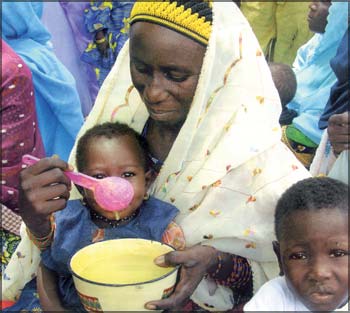|
Panos South Asia - UNDP South Asia-Asia Pacific
Editors’ Roundtable on:
Inequality and Hunger
Colombo was the venue where nearly twenty editors from across the
South Asia-Asia Pacific region met to take part in a two day conference
organised by the Panos Institute in Sri Lanka (part of Panos South Asia)
and United Nations Development Program (UNDP) in the first week of
February 2009.
The objective of the discourse was to frame a better media strategy
to deal with more effective coverage of Hunger-related issues; thus
minimising hunger and poverty in the region.
|

Poor children worst affected by financial crisis |
The roundtable followed up a media research carried out by the Panos
Institute in Sri Lanka to ascertain levels of coverage and importance
given to issues of hunger by the English media across seven Asia Pacific
countries.
Five English newspapers were selected from the following countries
which had representation at the conference: India, Bangladesh, Pakistan,
Nepal, Sri Lanka, Thailand and Cambodia.
A comparative analysis was carried out to examine which
hunger-related issues were given most coverage in the region’s media the
most.
The media audit on Hunger was presented at the Editors’ roundtable.
This helped to highlight the lack of focus in almost all Asia Pacific
countries on poverty and hunger issues, in both urban and rural
settings.
The discussion at the Editors’ roundtable took up issues pertaining
to Inequality and Hunger in the region. The main speakers were Omar
Noman, Chief of Policies and Programs, UNDP Asia Regional Centre,
Colombo and other UNDP officials who are part of the UNDP hunger
eradication campaign.
A paper on Media trends and Challenges was presented by UNDP
Communications Officer, Manisha Mishra.
The Roundtable discussions that followed also looked at issues
pertaining to hunger in the region, like targeted interventions against
Hunger, International food policy architecture and Media trends and
challenges.
Among the points raised by the participants which included senior
editors, news editors and mid-career journalists, was the lack of media
focus on soaring hunger levels among the urban poor, which is closely
related to migration of the rural poor.
According to a presentation by T Palanivel, a senior adviser for the
UNDP Regional Centre in Colombo, Asia still has over 900 million people
living in extreme poverty.
In the past decade, Asia was able to lift about 300 million people
out of these conditions, but now they are at risk because of the global
financial crisis. A one percent decline in growth in the developing
world could push an additional 20 million people into poverty and
hunger.
The deliberations were moderated by Kunda Dixit, Editor, Nepali
Times, Paranjoy Guha Thakurta, TV journalist and Pamela Philipose,
Director, Women’s Feature Service.
The discussions resulted in sharing ideas of how the media
initiatives already taken to eradicate hunger, poverty and improve
leadership capacities of the public could be used as common measures in
the Asia Pacific region.
Lalitha Panicker, Assistant Editor,The Hindustan Times spoke of two
highly popular campaigns carried out by The Times of India, India’s
largest circulating newspaper, primarily as an effort to boost sales but
which also contributed significantly towards social change.
Panicker explained that while the paper achieved its primary
objective with the two campaigns, Lead India and Teach India, it also
created a trend in media initiatives towards development that could be
replicated by newspapers in other countries.
The Times of India’s Teach India campaign called upon educated
Indians to help teach underprivileged children while the “Lead India”
campaign provided an opportunity for youth of all strata of life to come
forward to display their leadership abilities.
Taking this as a positive indicator of initiatives the media can
bring out to facilitate social change, the roundtable affirmed the fact
that media holds an important role in eradicating inequality and
changing the status quo of hunger in South Asia and the Pacific.
Another key thought that emerged from the discussion was emphasised
by Kunda Dixit who said that the location was a primary message
imparting factor when organising conferences that are held to initiate
change in a country or a region.
As Pamela Philipose, Director, Women’s Feature Service in India
pointed out, media should cultivate the art of telling old stories in a
new way and not only be obsessed with bad news.
It was agreed that positive stories was a great empowerment of
change. As Nurul Kabir, the Editor-in-chief of The New Age in Bangladesh
stated, “ true journalism is when one avoids writing anything he is not
convinced of and commits himself to the kind of journalism that changes
mindset”.
Editors pointed out in their concluding remarks that the event should
be followed up to share the long lasting impact of the roundtable. |





